In a discussion with Saban Forum Chairman Haim Saban before an audience of Americans and Israelis, former Secretary of State Hillary Clinton championed the Obama administration’s efforts to advance a nuclear deal with Iran, and downplayed reports of frictions between the American and Israeli leaderships as the healthy consequence of “two raucous democracies.”
Watch the entire discussion between Saban and Clinton here, and please check the main Saban Forum 2014 site for live and archived material from other webcast sessions, including addresses by Israeli Labor Party leader Isaac Herzog, Vice President Joe Biden, Prime Minister Benjamin Netanyahu (via satellite), Secretary of State John Kerry, as well as a fascinating discussion between Brookings Foreign Policy Vice President Martin Indyk and Israeli Minister of Economy Naftali Bennett.
Clinton’s remarks on Iran have already been closely scrutinized the context of her much-speculated 2016 presidential prospects and the opposition to Obama’s diplomatic overtures toward Tehran from both the U.S. Congress and several of Washington’s most important regional allies, especially Israel. However, while there were subtle hints of a more hard-nosed approach to Iran, Clinton staunchly defended the diplomacy as “a very important effort” and underscored the importance of Obama’s multilateral approach in resolving the nuclear impasse.
Although Clinton had left office months before the domestic shifts in Iran that revived the nuclear diplomacy, she noted that she authorized the first quiet back-channel talks between American and Iranian diplomats in Oman. And when asked by Saban, in a question that seemed to parallel his own recent criticism of the administration, if the United States had proffered too many carrots, Clinton quickly dismissed the assessment. She stressed that “my bottom line is that a deal that verifiably closes all of Iran’s pathways to a nuclear weapon — and the key there is verifiably, and all, including covert efforts — that is what is at the center of this negotiation.” She did not weigh in on the prospects of Congressional efforts to advance new sanctions, but she did underscore that “no deal is better than a bad deal.”
Clinton attributed the diplomatic breakthrough to the multilateral sanctions regime put in place during Obama’s first term, and underscored the importance of previously unattainable international support for economic pressure and adherence to the measures.
“We had unilateral sanctions that the United States had adopted…and we were committed to that pathway, but it wasn’t enough. Unless we could get sanctions through the Security Council, sanctions from the European Union, and create an environment in which other countries would feel compelled to abide by those sanctions, we were never going to be able to put the kind of economic pressure on the regime.”
She cited the 2009 unrest that erupted in Iran after the contested reelection of then-president Mahmoud Ahmadinejad as having “aided us to a certain extent in making the case for getting those sanctions.” She noted the other challenges posed by Iranian policies across the region, but reiterated her support for the nuclear talks.
“I think that we made the correct decision to get the sanctions imposed internationally, get our partners to the table, begin the negotiations, be willing to enter into the interim agreement which has so far as we know stopped their nuclear program, to be absolutely clear about the kind of intrusive, constant inspections that would be required to reach the threshold of verifiability that we would seek, and to be very clear in any deal about what the consequences would be of any violation by Iran — and that would include, as we say, keeping all options on the table.”
Clinton noted that to date, diplomacy has not undercut the sanctions regime, suggesting that there has been “nibbling around the edges” but that a robust framework for economic pressure remains intact, in part because “remarkably, our partners have not jumped ship. They have stayed in the negotiations.”
There were small hints of a slightly tougher line than the current Secretary of State. Clinton did not hypothesize about a new relationship with Iran, and she referred to the current talks as “nuclear weapons negotiations,” reflecting a widely-accepted presumption about Iranian aims but one that is vigorously contested by Tehran. She reminded the audience that her State Department interceded with Twitter to postpone a service interruption so that Iranians could continue to utilize the tool to communicate during the protests — a step that some media reports have suggested the White House opposed. And she suggested that her 2008 campaign proposal for an American security umbrella for the Arab Gulf states is “worth being resurrected.”
Still, Clinton did not pull her punches in discussing the expansion of Iranian influence in the region, attributing some responsibility to the Arab states themselves, saying:
“a lot of this is weakness that Iran takes advantage of, and you know, in this world, you can be mad at somebody taking advantage of you. But at the end of the day, that’s your fault. That you haven’t figured out how to defend yourself, and how to protect yourself, and how to fend off external interests, and how to treat your own people in a way that they will not look outside your borders. That’s part of what’s been going on, as you know, and the Iranians have been incredibly focused on exploiting any opening.”
Clinton also pointed to Iran as the source of some regrets from her time as the nation’s chief diplomat, lamenting the decision to avoid strenuous American advocacy on behalf of the millions of Iranians who came to the streets to protest in 2009.
“I wish we had spoken out more,” she said, adding questioned about whether it would have actually generated a different outcome, “you never know what you might say that could give heart to people, could encourage them, could get some off the fence they’re sitting on and possibly take action, you just, you never know…if these were easy choices, we could do them by a computer, if they didn’t require any kind of judgment. In that case, we went with the expert consensus…It was such a fraught time.”
She compared Washington’s dilemma in handling the unrest to the subsequent uprisings across the Arab world, acknowledging that these crises are “fraught with difficult hard choices, trying to decide exactly what to do in difficult, uncharted territory… we were feeling our way forward trying to do the best we could under circumstances that were not within our control, that were rapidly changing, that had been predicted but nobody thought that they would happen as they did in Egypt and elsewhere.”
In enumerating her regrets, Clinton touched only briefly on the issue of Benghazi that critics, particularly Republicans in Congress, have emphasized. She acknowledged her deep regret for the loss of life of State Department staffers in various locations including Libya, saying “that’s always something you think, okay, what more, what more, what more could we have done?”
Although she devoted a considerable amount of time to Iran in the discussion, Clinton did not rank the nuclear issue as among the top priorities for the next U.S. president, instead citing terrorism, Russia, and China as the most pressing challenges for Obama’s successor. (She artfully dodged efforts to elicit her own plans with respect to the 2016 presidential election, laughing that “I have long learned not to answer hypothetical, theoretical questions.”)
On ISIS, she advocated that Washington should “take the coalition that the President and Secretary Kerry have constructed and make sure it is more than just a rhetorical debating society, but it is a commitment by nations of goodwill and commitment to deal with the threats that the new brand of more socially adept, more well-organized terrorism particularly as we see with ISIS — holding territory, trying to establish at state right in the heart of the Middle East.”
She was deeply critical of former Iraqi prime minister Nouri al-Maliki, denouncing his governance of Iraq for transforming the Iraqi armed forces into “personal militia for him instead of a national army” and calling his recent removal “long overdue.” “We’re in for a long struggle, but I think we have in the last months put together the pieces of a strategy, starting first and foremost with the removal of Maliki as prime minister in Iraq.” She added that “getting him off the stage has led to a couple of positive changes,” including the agreement concluded last week between the central Iraqi government and the Kurds over oil revenues.
Clinton made the case for rehabilitating the formerly cooperative relationship between Israel and Turkey, arguing that “we’ve got to double down and try to work with them and that means even through periods where they say and do things where I and, I think, many of us are not happy about. They’re too strategically located, they’re too big, they can be a force for positive change, or a source for continuing difficulties. So let’s try to work toward the former.”
Clinton also spoke about Egypt, and expressed a sense of frustration that the young Egyptians she met with in Cairo shortly after the revolution did not seek to capitalize on their momentum and remain politically active.
“And they were incredibly relieved and feeling quite validated that their efforts had led to the overthrow of Mubarak. So when I asked them, so what do you do next? Are you going to form a political party? Are you going to run people for office in these elections you have demanded? Oh no, they said, we don’t do politics. And I said, well, in a democracy — if that’s what you want — you’ve got to do politics. And they looked at me like I was a relic from some ancient civilization that had ended up in Cairo.”
She said that she warned the students that the Muslim Brotherhood and the military were the best organized forces in society, and noted ruefully that “they won in succession and we’re back to the status quo ante, almost.” She returned again to the difficulties for Washington in navigating its competing interests in supporting a long-time ally and encouraging a democratic transition, acknowledging that “we were blamed by all sides…and it never got any better. No matter what we did, we were criticized for it.”
Clinton did not delve into the issues with the military government in Egypt — which has engaged in systematic repression and squelched free speech and civil society — arguing that “it is time to reboot the relationship and do whatever is possible to work with the new leadership to not make the same mistakes.”
The former secretary of state also addressed the U.S.-Israeli relationship — the central focus for the forum — detailing the cooperation between the two governments and arguing that “nobody can argue with the commitment of this administration to Israel’s security.” She advocated for continuing efforts to achieve a peace agreement between Israelis and Palestinians, saying “I believe the absence of negotiations leaves a vacuum that gets filled by problems, bad actors, threats. The efforts undertaken in the last several years are very much in the interest of Israel and the Palestinians.”
Clinton acknowledged recent reports of frictions between American and Israeli leaders, saying that “at times there are going to be differences and I don’t think it’s personal. I think it is a different perspective about sometimes what we think is best for our friends may not be what our friends think is best for them. And when we say that, I don’t believe that is disrespectful or rupturing the relationship. I think that’s an honest relationship. That’s the kind of friends I want.” She maintained that as “two raucous democracies … you do get carried away from time to time.”
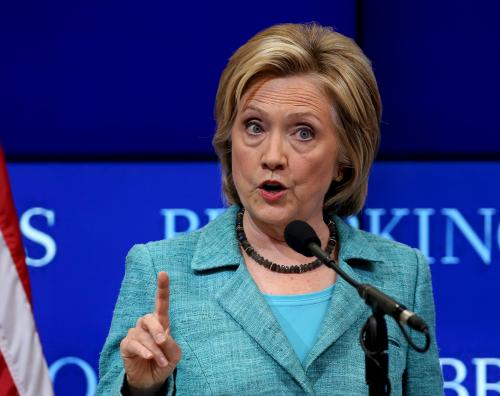
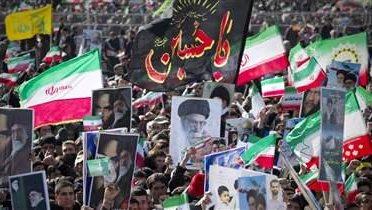
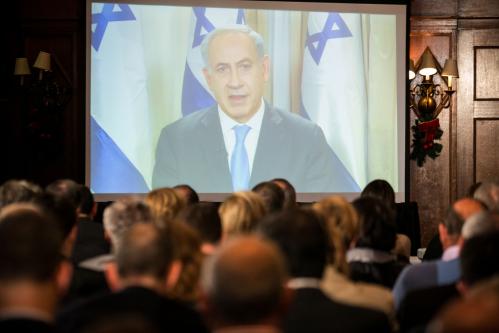
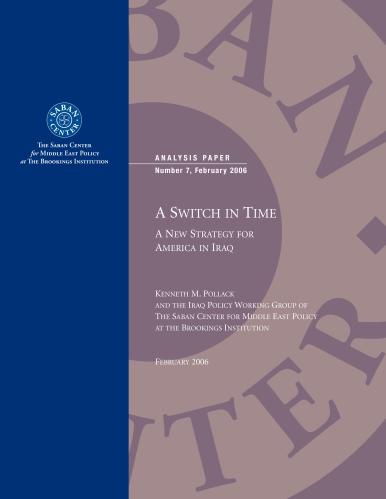
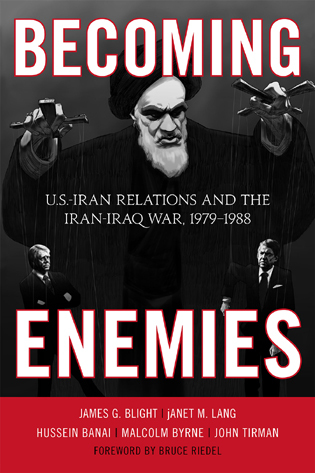
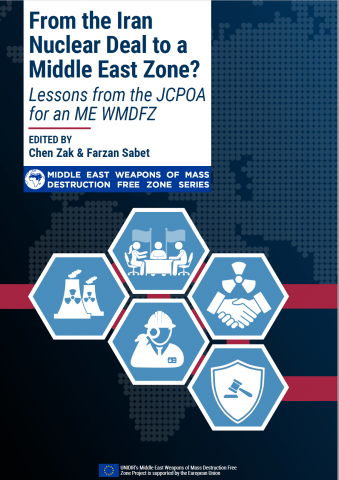




Commentary
Addressing America’s Challenges in the Middle East, Hillary Clinton Backs Diplomacy with Iran
December 7, 2014